21 may 2018
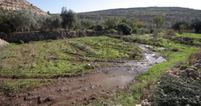
The illegal settlement of Ariel in the occupied West Bank continues to dump its wastewater into Palestinian lands west of Salfit, causing large-scale air, water and soil pollution, according to local sources.
Local residents complained of foul odors nowadays due to the large amount of sewage coming from Ariel settlement, especially with the current heat wave hitting the area.
The flow of Ariel's waste has already damaged the flora and fauna in Wadi al-Matawi area, between Salfit and Ariel.
Many Palestinian farmers have suffered from agricultural losses after the resulting pollution caused widespread damage to their cultivated plots of land.
This issue has been going on for many years now as the settlement persistently keeps pumping sewage water into Wadi al-Matawi, with no regard to the environment or the local residents.
Local residents complained of foul odors nowadays due to the large amount of sewage coming from Ariel settlement, especially with the current heat wave hitting the area.
The flow of Ariel's waste has already damaged the flora and fauna in Wadi al-Matawi area, between Salfit and Ariel.
Many Palestinian farmers have suffered from agricultural losses after the resulting pollution caused widespread damage to their cultivated plots of land.
This issue has been going on for many years now as the settlement persistently keeps pumping sewage water into Wadi al-Matawi, with no regard to the environment or the local residents.
12 may 2018
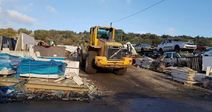
The representative of the European Union (EU) and heads of its mission in Jerusalem and Ramallah have condemned Israel’s demolition of structures and appropriation of equipment funded by the EU in Masafer Yatta area of the occupied West Bank.
In a statement released on Thursday, the EU officials expressed strong concern about the demolition and seizure by the Israeli authorities of several Palestinian-owned structures in four Palestinian communities located in the Masafer Yatta area in Area C of the occupied West Bank, on May 2, 2018, pointing out that several of these structures were funded by the EU and EU member states.
“More than 40 Palestinian residents of these communities have lost their homes. The seizure of solar energy units, as well as water filtration systems, deprives them of access to energy and water,” their statement said.
They called on the Israeli authorities “to halt demolitions of Palestinian houses and property, in accordance with its obligations as an occupying power under international humanitarian law, and to cease the policy of settlement construction and expansion, of designating land for exclusive Israeli use and of denying Palestinian development.”
They also demanded the Israeli authorities to rebuild the structures in the same place, and return the seized items to the communities.
In a statement released on Thursday, the EU officials expressed strong concern about the demolition and seizure by the Israeli authorities of several Palestinian-owned structures in four Palestinian communities located in the Masafer Yatta area in Area C of the occupied West Bank, on May 2, 2018, pointing out that several of these structures were funded by the EU and EU member states.
“More than 40 Palestinian residents of these communities have lost their homes. The seizure of solar energy units, as well as water filtration systems, deprives them of access to energy and water,” their statement said.
They called on the Israeli authorities “to halt demolitions of Palestinian houses and property, in accordance with its obligations as an occupying power under international humanitarian law, and to cease the policy of settlement construction and expansion, of designating land for exclusive Israeli use and of denying Palestinian development.”
They also demanded the Israeli authorities to rebuild the structures in the same place, and return the seized items to the communities.
7 may 2018

Head of the Popular Committee Against the Siege Jamal al-Khudari on Monday called on Arab Red Crescent societies and concerned international organizations to urgently send medical aid to Gaza to save its collapsing health sector.
Al-Khudari said in statements that Gaza hospitals have unprecedentedly run out of 50% of much-needed drugs and medical supplies.
Al-Khudari pointed out that 80% of the Gaza Strip residents live below the poverty line with $2 per capita daily income, adding that food insecurity rate in the besieged enclave has reached 60%.
He said that over a quarter of a million Gazan workers are currently unemployed, noting that about one million refugees live on limited aid from UNRWA which is suffering from accumulated fiscal deficit due to US and Israeli pressures.
The Palestinian official continued to say that 25% of the homes that were completely destroyed during the 2014 Israeli offensive on Gaza have not been reconstructed yet because of the lack of funding and building materials.
Moreover, according to al-Khudari, 95% of Gaza's water is undrinkable, while the two million residents of the besieged territory suffer from power outages that last for 18-20 hours a day.
Al-Khudari said in statements that Gaza hospitals have unprecedentedly run out of 50% of much-needed drugs and medical supplies.
Al-Khudari pointed out that 80% of the Gaza Strip residents live below the poverty line with $2 per capita daily income, adding that food insecurity rate in the besieged enclave has reached 60%.
He said that over a quarter of a million Gazan workers are currently unemployed, noting that about one million refugees live on limited aid from UNRWA which is suffering from accumulated fiscal deficit due to US and Israeli pressures.
The Palestinian official continued to say that 25% of the homes that were completely destroyed during the 2014 Israeli offensive on Gaza have not been reconstructed yet because of the lack of funding and building materials.
Moreover, according to al-Khudari, 95% of Gaza's water is undrinkable, while the two million residents of the besieged territory suffer from power outages that last for 18-20 hours a day.
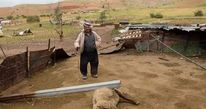
The Israeli military on Sunday evening threatened to cut water supplies to al-Ras al-Ahmar community, in the northern Jordan Valley.
According to local sources, Israeli soldiers notified the local farmers of their intent to break down pipelines providing water to Sahl Atouf community, east of Tamoun town.
The Israeli occupation forces and authorities continue to target agricultural and residential facilities in the Jordan Valley under the guise of military maneuvers and also for the benefit of illegal settlement expansion.
According to local sources, Israeli soldiers notified the local farmers of their intent to break down pipelines providing water to Sahl Atouf community, east of Tamoun town.
The Israeli occupation forces and authorities continue to target agricultural and residential facilities in the Jordan Valley under the guise of military maneuvers and also for the benefit of illegal settlement expansion.
14 apr 2018
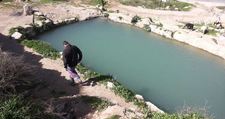
The Israeli occupation's greed goes further with more Palestinian lands and sites stolen in Occupied Jerusalem. Judaization operations are in full swing in an attempt to alter the holy city's identity taking advantage of the US recognition of Jerusalem as Israel's capital.
The Israeli occupation authorities are planning to take control of Ain al-Haniya, which is located in al-Walaja village south of Occupied Jerusalem, and the surrounding lands to turn them into an Israeli national park.
Ain al-Haniya
Ain al-Haniya is one of the most important water springs in Jerusalem which flows from a rocky cave that is linked to a set of underground water channels which lead to many of the city's small waterfalls.
Member of al-Walaja village council Omar Hajajleh said that Ain al-Haniya is located in a Palestinian area occupied since 1967. "We used to visit it every now and then for recreation," he added, "But after the separation wall was built around al-Walaja, taking a long bypass road became the only way to reach Ain al-Haniya."
Hajajleh told the PIC reporter that the Israeli authorities intend to move al-Walaja military checkpoint to another location two kilometers away from the current one, which would deny the West Bank Palestinians access to the water spring. He noted that the authorities are also preparing for a national park project in the area.
History and Future
Ain al-Haniya is everything to the people of al-Walaja. It is their past, present and future. They always say, "You are never a Walaja resident until you drink from Ain al-Haniya."
Hajajleh explained that the new checkpoint will prevent the people of al-Walaja from reaching hundreds of dunums of their lands which are planted with olive and almond trees.
Ain al-Haniya is also special for the Christian community there. Some monks perform their prayers near the water spring on a regular basis.
History says that the late Palestinian archaeologist Dimitri Baramki discovered during excavations he conducted in 1930s the remains of a church, water canals, ponds and mosaic floors near Ain al-Haniya.
Israeli settlement practices
Peace Now movement said that the Israeli-controlled Jerusalem municipality is investing thousands of shekels to establish a checkpoint that prevents Palestinians from reaching Ain al-Haniya and turn it into a recreational place for Israelis only.
Peace Now pointed out that in 2010, the Israeli occupation authorities completed the construction of the separation wall around al-Walaja village and isolated it from Ain al-Haniya and about 250 dunums of its agricultural lands.
In 2013, Plan 12222 was approved, whereby the area surrounding Ain al-Haniya will be transformed into a national park. The Israeli government later invested millions of shekels in cooperation with the Jerusalem Development Authority to renovate the water spring.
Following the renovation operation, it was decided to relocate the military checkpoint, so that the Palestinians no longer could reach Ain al-Haniya.
On 12th February 2018, the so-called Security Committee of the Israeli war ministry approved the transfer of the checkpoint for "security purposes", but the real plan is to make Ain al-Haniya a purely Israeli site.
Israel's Minister of Jerusalem Affairs Ze'ev Elkin wrote this openly on his Facebook page, "Presently our goal is to move the police checkpoint into the park to make it accessible to all residents of Jerusalem (Israelis)."
Peace Now affirmed that the infrastructure work has been completed for the new checkpoint.
The Israeli occupation authorities are planning to take control of Ain al-Haniya, which is located in al-Walaja village south of Occupied Jerusalem, and the surrounding lands to turn them into an Israeli national park.
Ain al-Haniya
Ain al-Haniya is one of the most important water springs in Jerusalem which flows from a rocky cave that is linked to a set of underground water channels which lead to many of the city's small waterfalls.
Member of al-Walaja village council Omar Hajajleh said that Ain al-Haniya is located in a Palestinian area occupied since 1967. "We used to visit it every now and then for recreation," he added, "But after the separation wall was built around al-Walaja, taking a long bypass road became the only way to reach Ain al-Haniya."
Hajajleh told the PIC reporter that the Israeli authorities intend to move al-Walaja military checkpoint to another location two kilometers away from the current one, which would deny the West Bank Palestinians access to the water spring. He noted that the authorities are also preparing for a national park project in the area.
History and Future
Ain al-Haniya is everything to the people of al-Walaja. It is their past, present and future. They always say, "You are never a Walaja resident until you drink from Ain al-Haniya."
Hajajleh explained that the new checkpoint will prevent the people of al-Walaja from reaching hundreds of dunums of their lands which are planted with olive and almond trees.
Ain al-Haniya is also special for the Christian community there. Some monks perform their prayers near the water spring on a regular basis.
History says that the late Palestinian archaeologist Dimitri Baramki discovered during excavations he conducted in 1930s the remains of a church, water canals, ponds and mosaic floors near Ain al-Haniya.
Israeli settlement practices
Peace Now movement said that the Israeli-controlled Jerusalem municipality is investing thousands of shekels to establish a checkpoint that prevents Palestinians from reaching Ain al-Haniya and turn it into a recreational place for Israelis only.
Peace Now pointed out that in 2010, the Israeli occupation authorities completed the construction of the separation wall around al-Walaja village and isolated it from Ain al-Haniya and about 250 dunums of its agricultural lands.
In 2013, Plan 12222 was approved, whereby the area surrounding Ain al-Haniya will be transformed into a national park. The Israeli government later invested millions of shekels in cooperation with the Jerusalem Development Authority to renovate the water spring.
Following the renovation operation, it was decided to relocate the military checkpoint, so that the Palestinians no longer could reach Ain al-Haniya.
On 12th February 2018, the so-called Security Committee of the Israeli war ministry approved the transfer of the checkpoint for "security purposes", but the real plan is to make Ain al-Haniya a purely Israeli site.
Israel's Minister of Jerusalem Affairs Ze'ev Elkin wrote this openly on his Facebook page, "Presently our goal is to move the police checkpoint into the park to make it accessible to all residents of Jerusalem (Israelis)."
Peace Now affirmed that the infrastructure work has been completed for the new checkpoint.
1 apr 2018
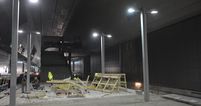
A Palestinian report has revealed that the Israeli occupation authority (IOA) started to carry out a major railway project aimed at linking its illegal settlements in the West Bank with the 1948 occupied territory (Israel).
According to a report released recently by the National Bureau for Defending Land, the railway project will first link all West Bank settlements with each other and then link them all with cities in Israel. The project is expected to be completed in 2025.
The IOA already seized about 2,000 dunums of Palestinian land for the project, especially in the West Bank villages of Zawiya, Mas-ha, Biddya, Sarta, Kafr ad-Dik and Bruqin.
The project, which includes 11 railway lines and 30 passenger stations, will lead to the destruction of vast tracts of agricultural land and water resources in the annexed Palestinian areas.
According to a report released recently by the National Bureau for Defending Land, the railway project will first link all West Bank settlements with each other and then link them all with cities in Israel. The project is expected to be completed in 2025.
The IOA already seized about 2,000 dunums of Palestinian land for the project, especially in the West Bank villages of Zawiya, Mas-ha, Biddya, Sarta, Kafr ad-Dik and Bruqin.
The project, which includes 11 railway lines and 30 passenger stations, will lead to the destruction of vast tracts of agricultural land and water resources in the annexed Palestinian areas.
12 mar 2018
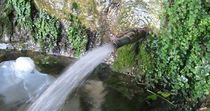
Palestinian farmers from Salfit province have raised alarm bells over the repercussions of Israel’s settlement activity and settler break-ins into Salfit’s natural sites and reserves.
Researcher Khaled Maali said Israeli settlers have been ransacking natural sites in Salfit, among other areas in the occupied West Bank, and placing Hebrew-speaking banners to mislead visitors about the history of the sites.
Israeli settlers have also been swimming in Salfit’s spring waters, of which they claim ownership, and attending lectures on their alleged Israeli history.
Maali and the Palestinian locals stressed the need to rehabilitate such natural sites, particularly water springs and resources located near Israeli settlement outposts and in the Israeli-occupied Area C, and to intensify the presence of Palestinian students and visitors in the area so as to protect such a resourceful natural legacy and enlarge the younger generations’ knowledge about their natural heritage.
Researcher Khaled Maali said Israeli settlers have been ransacking natural sites in Salfit, among other areas in the occupied West Bank, and placing Hebrew-speaking banners to mislead visitors about the history of the sites.
Israeli settlers have also been swimming in Salfit’s spring waters, of which they claim ownership, and attending lectures on their alleged Israeli history.
Maali and the Palestinian locals stressed the need to rehabilitate such natural sites, particularly water springs and resources located near Israeli settlement outposts and in the Israeli-occupied Area C, and to intensify the presence of Palestinian students and visitors in the area so as to protect such a resourceful natural legacy and enlarge the younger generations’ knowledge about their natural heritage.
5 feb 2018
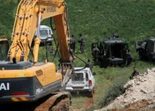
Israeli bulldozers destroyed water lines supplying tens of acres of land in the northern Jordan Valley, on Monday morning.
Local activist Aref Daraghmeh told Ma’an News Agency that Israeli bulldozers destroyed a water pipeline belonging to a Palestinian identified as Bassem Faqha.
The line feeds some 150 dunams (37 acres) of land planted with watermelons.
The Jordan Valley forms a third of the occupied West Bank, with 88 percent of its land classified as Area C — under full Israeli military control.
Demolitions of Palestinian infrastructure and residences occur frequently in Area C, with the Jordan Valley’s Bedouin and herding communities being particularly vulnerable to such policies.
Israeli forces confiscated cattle and water tanks, as well as agricultural machinery from Bedouin Palestinians in the so-called firing zone in September of last year.
Local activist Aref Daraghmeh told Ma’an News Agency that Israeli bulldozers destroyed a water pipeline belonging to a Palestinian identified as Bassem Faqha.
The line feeds some 150 dunams (37 acres) of land planted with watermelons.
The Jordan Valley forms a third of the occupied West Bank, with 88 percent of its land classified as Area C — under full Israeli military control.
Demolitions of Palestinian infrastructure and residences occur frequently in Area C, with the Jordan Valley’s Bedouin and herding communities being particularly vulnerable to such policies.
Israeli forces confiscated cattle and water tanks, as well as agricultural machinery from Bedouin Palestinians in the so-called firing zone in September of last year.
22 jan 2018

The Israeli occupation authorities on Monday issued orders to demolish and evacuate Palestinian structures in Bethlehem province.
Hasan Brijiyah, from the Popular Anti-Settlement Committee, said an Israeli patrol showed up in Khilet al-Nakhla and handed over a Palestinian family a notification to evacuate their land tract, covering an area of 45 dunums, after they declared it “state property”.
Another Palestinian citizen—Mohamed Ayesh—received an order to stop the construction of a water well on his land lot under the pretext of unlicensed construction.
Sometime earlier, an Israeli court confirmed Brijiya’s ownership of the land, after Israeli settlers tried to seize it, added Ayesh.
The activist warned of the swift pace of Israel’s demolition policies throughout the West Bank, which he said have been remarkably nurtured by the U.S. President Donald Trump’s recognition of Occupied Jerusalem as Israel’s capital, among other unilateral moves made at the expense of Palestinian rights.
Hasan Brijiyah, from the Popular Anti-Settlement Committee, said an Israeli patrol showed up in Khilet al-Nakhla and handed over a Palestinian family a notification to evacuate their land tract, covering an area of 45 dunums, after they declared it “state property”.
Another Palestinian citizen—Mohamed Ayesh—received an order to stop the construction of a water well on his land lot under the pretext of unlicensed construction.
Sometime earlier, an Israeli court confirmed Brijiya’s ownership of the land, after Israeli settlers tried to seize it, added Ayesh.
The activist warned of the swift pace of Israel’s demolition policies throughout the West Bank, which he said have been remarkably nurtured by the U.S. President Donald Trump’s recognition of Occupied Jerusalem as Israel’s capital, among other unilateral moves made at the expense of Palestinian rights.
15 jan 2018
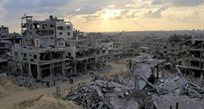
Israeli daily Haaretz, on Monday, reported that Israeli military officials have acknowledged that the Palestinian situation is deteriorating, and that the economy and infrastructure in Gaza was “from zero to below zero.”
Haaretz said, according to the PNN, that Israeli politicians were acting as if military pressure can continue on Gaza, ignoring the worsening economic situation in the Strip.
“In the long term, continually deteriorating infrastructure brings the risk of an uncontrollable blow-up in the Strip,” the daily said.
This deterioration is noticed through the number of trucks crossing the Karm Abu Salem crossing between Gaza and Israel that has dropped by half, due to the decline in the purchasing power of the Palestinians living in Gaza.
The report also said that about 95 percent of Gaza’s water was undrinkable and that unemployment was inching toward 50 percent and was even higher among young people.
Haaretz said, according to the PNN, that Israeli politicians were acting as if military pressure can continue on Gaza, ignoring the worsening economic situation in the Strip.
“In the long term, continually deteriorating infrastructure brings the risk of an uncontrollable blow-up in the Strip,” the daily said.
This deterioration is noticed through the number of trucks crossing the Karm Abu Salem crossing between Gaza and Israel that has dropped by half, due to the decline in the purchasing power of the Palestinians living in Gaza.
The report also said that about 95 percent of Gaza’s water was undrinkable and that unemployment was inching toward 50 percent and was even higher among young people.
12 jan 2018
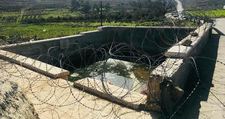
The Israeli Occupation Forces (IOF) closed Friday evening al-Dilba spring in Fawar refugee camp south of al-Khalil.
According to the PIC reporter, IOF closed the road leading to al-Dilba spring north of the camp, preventing local farmers from approaching it.
This came as part of Israeli daily restrictions on Palestinian residents in al-Fawar camp.
According to the PIC reporter, IOF closed the road leading to al-Dilba spring north of the camp, preventing local farmers from approaching it.
This came as part of Israeli daily restrictions on Palestinian residents in al-Fawar camp.
Page: 2 - 1
